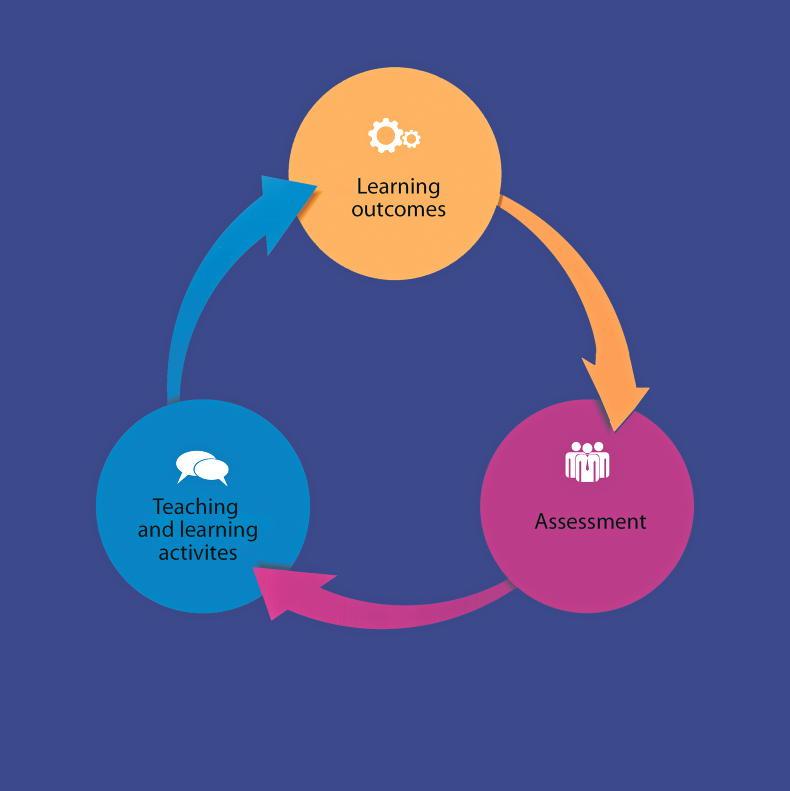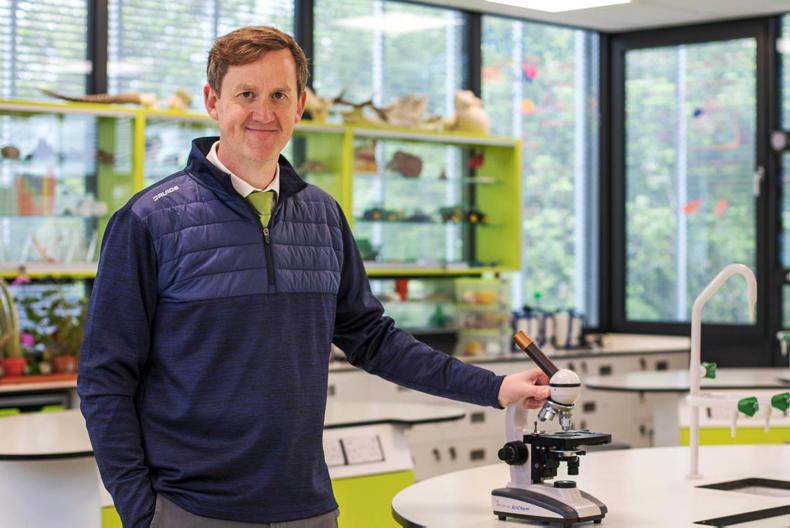Developing any new Leaving Certificate course is a long and rigorous process which requires high levels of collaboration.
The redesign of the agricultural science course was no different – but teachers and syllabus design professors have criticised the lack of constructive syllabus alignment in its learning outcomes-only approach.
Senior Cycle redevelopment
In April 2022, in response to the National Council for Curriculum and Assessment (NCCA) Senior Cycle Advisory Report (2022), Minister for Education, Norma Foley TD, requested that the NCCA undertake a series of actions to support the implementation of the Department of Education plan ‘Equity and Excellence for All’. Two key actions set out in this plan, relevant to this request, were for the NCCA to:
• Consider the level of detail included in subject specifications
• Prepare a schedule of senior cycle subjects for redevelopment (for approval by the minister)
On 10 May 2023, the Irish Agricultural Science Teachers Association (IASTA) wrote a letter outlining their concerns to Minister Foley. They wanted an open and meaningful dialogue that, in their opinion, would not only assist with agricultural science but also guide the development and reform of other subjects.
Since its implementation, IASTA said the new course specifications have created major concerns for the sustainability of agricultural science as a subject, as well as progression into relevant higher education courses and future careers.
The key issues that IASTA raised were:
• The interpretation of learning outcomes is difficult for both pupils and teachers
• The learning outcomes are broad and non-specific in their outline
• The diversity across learning outcomes means teachers do not know how much time to allocate to the different topics and/ or strands
• Certain learning outcomes are ‘incorrectly written’
• The Individual Investigative Study (IIS) is inaccessible for many students.
Department of Education
IASTA did not receive acknowledgement of their letter and the concerns they outlined. Irish Country Living further contacted the Department of Education last week and a spokesperson issued the following response: “Having reviewed the matter, it is acknowledged that the Department has no record of having issued a response to the letter from IASTA received in 2023. This appears to have been due to an administrative oversight and the Department intends to issue a response to IASTA as soon as possible addressing the issues it has raised.
“Members of the Irish Agricultural Science Teachers Association (IASTA) were represented on the NCCA’s Subject Development Group for that subject. Officials from the Department and the NCCA met with IASTA in 2021 where IASTA raised some concerns
regarding the specification. An Agricultural Science in Practice Group was subsequently convened by the NCCA.
“In relation to the numbers of students studying agricultural science, the Leaving Certificate programme aims to provide all learners with a broad, balanced education while also offering some specialisation towards a particular option such as further education, an apprenticeship, and higher education or as a career option.”

What would the syllabus and structure of the new course design look like?
Learning outcomes-only template
Concerns have been raised not just by teachers, but also academics, professional bodies, Oireachtas committees and experts in curriculum design about the minimal ‘learning outcomes-only’ template currently being used by the NCCA for Junior Cycle and Leaving Certificate syllabi.
In Ireland’s education yearbook 2023, Declan Kennedy, senior lecturer in the school of education in University College Cork (UCC) and Áine Hyland, emeritus professor in the school of education in UCC published an article looking at ‘the need for a new template’.
It stated that the current design template is minimal, comprising little more than a list of topics and learning outcomes.
Declan states that there needs to be alignment between three factors for any syllabus with a learning-outcomes framework: the learning outcomes; the teaching and learning activities; and the assessment.
“The learning outcomes approach to syllabus design makes it impossible for teachers to successfully implement a syllabus without having details on the other two factors,” he says.
“In other words, learning outcomes must be linked to the teaching learning activities as well as the assessment.”
Áine has been involved in curriculum design for over 45 years. She says for any curriculum which will be assessed externally, by a national body, there should be, “very careful alignment between the learning outcomes along with detailed information and guidelines available to the teachers”.
“I am mystified as to why 10 to 12 years ago, the NCCA decided to go in a different direction and to separate, if you like, the assessment from the curriculum design,” she says.
“We saw it in agricultural science – some questions came up on the paper that didn’t appear to be covered at all in the curriculum that they got. That, of course, is exactly why one has to have that careful alignment. That has to exist from the very beginning, so there’s no confusion and no ambiguity.”
Ultimately, Áine believes the fundamental issue is the existing disconnect between the syllabus and the examination.
“It’s very demoralising for a student who is genuinely interested in agricultural science, and really would like to move forward,” she says.
“They want to know that the syllabus is accurate, that the textbooks are accurate, and that the exam will reflect what’s in the syllabus and the textbook.”
NCCA response
In week one of this two part series, the focus was on the drop in students studying agricultural science. In the teacher’s survey conducted by Irish Country Living, 76% said they had seen a decline in the number of students studying the course since the introduction of the new syllabus in 2019.
Irish Country Living reached out to the NCCA for comment.
They responded, saying since the early 2000s, Ireland has been moving towards an outcomes-based approach to curriculum development with, “learning being defined in terms of what students should be able to know and do at the end of a course”.
“Following a meeting between NCCA, DE and IASTA representatives on issues identified by IASTA regarding the specification for Agricultural Science, NCCA established the Agricultural Science in Practice Group (AGiP) to monitor the enactment of the Leaving Cert Agricultural Science specification for the primary purpose of collating insights from teachers as they enact the specification in their classroom contexts.”
The NCCA also mentions that the revised agricultural science curriculum coincided with the COVID-19 pandemic and school closures which contributed to the challenges of learning and teaching the subject.
“It can be expected that there will be a decrease in the proportion of students choosing some other subjects which cannot be regarded as unexpected due to the number of subjects on offer to students increasing,” NCCA says. “We would not consider it wise to speculate as to any potential causes for the modest difference between the numbers of candidates for this subject in the last two years in comparison to the preceding years.”
State Examinations Commissions
A representative from the State Examinations Commission also responded to Irish Country Living on the concerns expressed.
They said: “As one might expect, there has always been a certain amount of fluctuation from year to year in the percentage of students opting for this subject.
They went on to say: “Given the very modest scale of the change in numbers in the context of all of the above factors, we would not consider it wise to speculate as to any potential causes for the modest difference between the numbers of candidates for this subject in the last two years in comparison to the preceding years.”
Humphrey Jones, former Agricultural Science teacher

Humphrey Jones.
“I taught ag science for 15 years. It was evident, with the new course in particular, that there was less of an appetite for it at Leaving Certificate level and the school dropped it completely.
“I think the new specification, the assessment around it, and the disconnect between the specification and the assessment was a major factor as well. More students want to do well and if you look at the percentage of students getting H1s in ag science, it’s less than other science subjects such as biology.
“For me, I think that the reason why there are such low numbers getting the highest grades is because it’s almost impossible to know what to teach due to the nature of the specification. The specification, design and layout are anything but specific. There’s so much ambiguity in the meaning of the learning outcomes.”
Read more
Galway student wins Irish EU young translator award
Agri Careers: a love for machinery and a passion for business
Developing any new Leaving Certificate course is a long and rigorous process which requires high levels of collaboration.
The redesign of the agricultural science course was no different – but teachers and syllabus design professors have criticised the lack of constructive syllabus alignment in its learning outcomes-only approach.
Senior Cycle redevelopment
In April 2022, in response to the National Council for Curriculum and Assessment (NCCA) Senior Cycle Advisory Report (2022), Minister for Education, Norma Foley TD, requested that the NCCA undertake a series of actions to support the implementation of the Department of Education plan ‘Equity and Excellence for All’. Two key actions set out in this plan, relevant to this request, were for the NCCA to:
• Consider the level of detail included in subject specifications
• Prepare a schedule of senior cycle subjects for redevelopment (for approval by the minister)
On 10 May 2023, the Irish Agricultural Science Teachers Association (IASTA) wrote a letter outlining their concerns to Minister Foley. They wanted an open and meaningful dialogue that, in their opinion, would not only assist with agricultural science but also guide the development and reform of other subjects.
Since its implementation, IASTA said the new course specifications have created major concerns for the sustainability of agricultural science as a subject, as well as progression into relevant higher education courses and future careers.
The key issues that IASTA raised were:
• The interpretation of learning outcomes is difficult for both pupils and teachers
• The learning outcomes are broad and non-specific in their outline
• The diversity across learning outcomes means teachers do not know how much time to allocate to the different topics and/ or strands
• Certain learning outcomes are ‘incorrectly written’
• The Individual Investigative Study (IIS) is inaccessible for many students.
Department of Education
IASTA did not receive acknowledgement of their letter and the concerns they outlined. Irish Country Living further contacted the Department of Education last week and a spokesperson issued the following response: “Having reviewed the matter, it is acknowledged that the Department has no record of having issued a response to the letter from IASTA received in 2023. This appears to have been due to an administrative oversight and the Department intends to issue a response to IASTA as soon as possible addressing the issues it has raised.
“Members of the Irish Agricultural Science Teachers Association (IASTA) were represented on the NCCA’s Subject Development Group for that subject. Officials from the Department and the NCCA met with IASTA in 2021 where IASTA raised some concerns
regarding the specification. An Agricultural Science in Practice Group was subsequently convened by the NCCA.
“In relation to the numbers of students studying agricultural science, the Leaving Certificate programme aims to provide all learners with a broad, balanced education while also offering some specialisation towards a particular option such as further education, an apprenticeship, and higher education or as a career option.”

What would the syllabus and structure of the new course design look like?
Learning outcomes-only template
Concerns have been raised not just by teachers, but also academics, professional bodies, Oireachtas committees and experts in curriculum design about the minimal ‘learning outcomes-only’ template currently being used by the NCCA for Junior Cycle and Leaving Certificate syllabi.
In Ireland’s education yearbook 2023, Declan Kennedy, senior lecturer in the school of education in University College Cork (UCC) and Áine Hyland, emeritus professor in the school of education in UCC published an article looking at ‘the need for a new template’.
It stated that the current design template is minimal, comprising little more than a list of topics and learning outcomes.
Declan states that there needs to be alignment between three factors for any syllabus with a learning-outcomes framework: the learning outcomes; the teaching and learning activities; and the assessment.
“The learning outcomes approach to syllabus design makes it impossible for teachers to successfully implement a syllabus without having details on the other two factors,” he says.
“In other words, learning outcomes must be linked to the teaching learning activities as well as the assessment.”
Áine has been involved in curriculum design for over 45 years. She says for any curriculum which will be assessed externally, by a national body, there should be, “very careful alignment between the learning outcomes along with detailed information and guidelines available to the teachers”.
“I am mystified as to why 10 to 12 years ago, the NCCA decided to go in a different direction and to separate, if you like, the assessment from the curriculum design,” she says.
“We saw it in agricultural science – some questions came up on the paper that didn’t appear to be covered at all in the curriculum that they got. That, of course, is exactly why one has to have that careful alignment. That has to exist from the very beginning, so there’s no confusion and no ambiguity.”
Ultimately, Áine believes the fundamental issue is the existing disconnect between the syllabus and the examination.
“It’s very demoralising for a student who is genuinely interested in agricultural science, and really would like to move forward,” she says.
“They want to know that the syllabus is accurate, that the textbooks are accurate, and that the exam will reflect what’s in the syllabus and the textbook.”
NCCA response
In week one of this two part series, the focus was on the drop in students studying agricultural science. In the teacher’s survey conducted by Irish Country Living, 76% said they had seen a decline in the number of students studying the course since the introduction of the new syllabus in 2019.
Irish Country Living reached out to the NCCA for comment.
They responded, saying since the early 2000s, Ireland has been moving towards an outcomes-based approach to curriculum development with, “learning being defined in terms of what students should be able to know and do at the end of a course”.
“Following a meeting between NCCA, DE and IASTA representatives on issues identified by IASTA regarding the specification for Agricultural Science, NCCA established the Agricultural Science in Practice Group (AGiP) to monitor the enactment of the Leaving Cert Agricultural Science specification for the primary purpose of collating insights from teachers as they enact the specification in their classroom contexts.”
The NCCA also mentions that the revised agricultural science curriculum coincided with the COVID-19 pandemic and school closures which contributed to the challenges of learning and teaching the subject.
“It can be expected that there will be a decrease in the proportion of students choosing some other subjects which cannot be regarded as unexpected due to the number of subjects on offer to students increasing,” NCCA says. “We would not consider it wise to speculate as to any potential causes for the modest difference between the numbers of candidates for this subject in the last two years in comparison to the preceding years.”
State Examinations Commissions
A representative from the State Examinations Commission also responded to Irish Country Living on the concerns expressed.
They said: “As one might expect, there has always been a certain amount of fluctuation from year to year in the percentage of students opting for this subject.
They went on to say: “Given the very modest scale of the change in numbers in the context of all of the above factors, we would not consider it wise to speculate as to any potential causes for the modest difference between the numbers of candidates for this subject in the last two years in comparison to the preceding years.”
Humphrey Jones, former Agricultural Science teacher

Humphrey Jones.
“I taught ag science for 15 years. It was evident, with the new course in particular, that there was less of an appetite for it at Leaving Certificate level and the school dropped it completely.
“I think the new specification, the assessment around it, and the disconnect between the specification and the assessment was a major factor as well. More students want to do well and if you look at the percentage of students getting H1s in ag science, it’s less than other science subjects such as biology.
“For me, I think that the reason why there are such low numbers getting the highest grades is because it’s almost impossible to know what to teach due to the nature of the specification. The specification, design and layout are anything but specific. There’s so much ambiguity in the meaning of the learning outcomes.”
Read more
Galway student wins Irish EU young translator award
Agri Careers: a love for machinery and a passion for business











SHARING OPTIONS